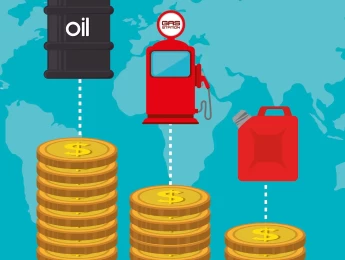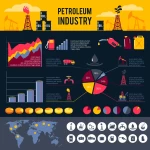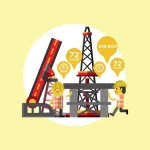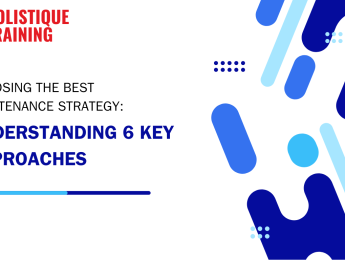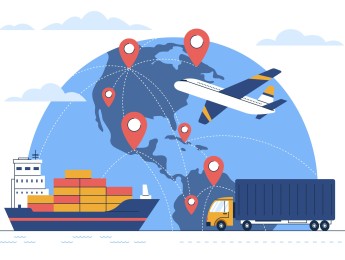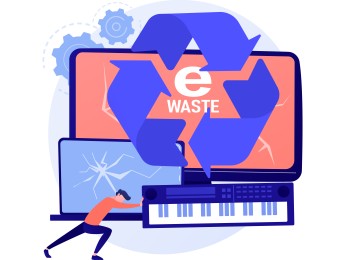- Table of Contents
- Introduction
- What Is Petroleum Economics?
- Why Is Petroleum Economics Important?
- Energy Backbone of the Modern World
- Influence on Global Economy
- Policy Making and Energy Security
- Investment and Capital Allocation
- Environmental Sustainability
- Global Energy Transition
- What Do Petroleum Economists Study?
- 1. Supply and Demand Dynamics
- 2. Pricing Mechanisms
- 3. Investment Analysis
- 4. Energy Policy and Regulation
- Is Petroleum Economics a Good Career Path?
- Stages of the Oil Industry
- 1. Exploration
- 2. Development
- 3. Production
- 4. Refining
- 5. Transportation and Distribution
- 6. Consumption
- Petroleum Economics and Risk Management
- Price Volatility
- Geopolitical Risks
- Environmental Risks
- Technological Risks
- Operational Risks
- Future Trends in Petroleum Economics
- 1. Sustainability and Renewable Energy Integration
- 2. Circular Economy and Waste Valorisation
- 3. Energy Transition and Carbon Neutrality Goals
- 4. Digitalisation and Big Data Analytics
- 5. Innovation in Enhanced Oil Recovery (EOR) Techniques
- Conclusion
Introduction
Petroleum, often called "black gold," has been a driving force behind global industrialisation and economic growth for over a century. As societies continue to rely heavily on petroleum and its byproducts, understanding the complexities of petroleum economics becomes increasingly vital. In this blog post, we will delve into the world of petroleum economics, exploring its significance, areas of study, career prospects, the stages of the oil industry, and the crucial link between petroleum economics and risk management.
What Is Petroleum Economics?
Petroleum economics is a multidisciplinary field that analyses the economic aspects of the petroleum industry. It focuses on understanding the production, distribution, and consumption of petroleum and the interplay of market forces, policy decisions, and global energy dynamics. Petroleum economists utilise economic theories, statistical models, and financial analysis to assess petroleum-related projects' profitability, feasibility, and risks.
Why Is Petroleum Economics Important?
Petroleum economics holds immense importance in today's interconnected global economy. The significance of this discipline can be elucidated through several key points, emphasising its crucial role in shaping policies, investments, and sustainable energy solutions:
Energy Backbone of the Modern World
Petroleum is the backbone of the modern world, fueling transportation, powering industries, and lighting homes. Its derivatives are omnipresent, from the gasoline that propels cars to the petrochemicals used in manufacturing countless everyday products. Understanding the economic intricacies of petroleum production and consumption is essential to ensure a continuous energy supply for various sectors, thereby maintaining the smooth functioning of economies globally.
Influence on Global Economy
The economic implications of the petroleum industry extend far beyond energy production. Fluctuations in oil prices directly impact inflation rates, trade balances, and overall economic stability. Petroleum economics helps governments and financial institutions anticipate and respond to these fluctuations, thereby mitigating adverse effects on national and global economies. Moreover, countries heavily reliant on oil exports depend on petroleum economics to diversify their economies and reduce vulnerability to price shocks.
Policy Making and Energy Security
Petroleum economics plays a pivotal role in shaping energy policies. Governments rely on analyses provided by petroleum economists to formulate sustainable energy strategies, which include balancing the demand for petroleum products with the need to reduce greenhouse gas emissions. Policymakers use economic models to assess the impact of subsidies, taxation, and regulations on the petroleum industry. By making informed decisions, nations can enhance their energy security, reduce dependency on foreign oil, and invest in alternative energy sources.
Investment and Capital Allocation
The petroleum industry involves substantial exploration, drilling, infrastructure, and technology investments. Petroleum economists evaluate these investments' financial viability, helping companies make strategic decisions about where to allocate their capital. Petroleum economists guide businesses towards profitable ventures by conducting cost-benefit analyses and assessing risk factors, ensuring a balance between maximising returns and managing financial risks.
Environmental Sustainability
In the era of climate change awareness, petroleum economics is instrumental in promoting environmental sustainability. Economists analyse the economic feasibility of transitioning towards cleaner energy sources, promoting energy efficiency, and reducing carbon emissions. They assess the economic impact of regulatory measures to curb pollution, encouraging the industry to adopt greener technologies. Petroleum economics fosters a delicate balance between meeting energy demands and preserving the environment for future generations.
Global Energy Transition
As the world moves towards renewable energy sources, petroleum economics remains at the forefront of this transition. Economists assess the economic viability of renewable projects, comparing their costs and benefits with traditional fossil fuel-based energy sources. They identify market trends, investment opportunities, and potential challenges, guiding both private enterprises and governments in making sustainable energy choices. By facilitating the global shift towards cleaner energy, petroleum economics contributes significantly to mitigating climate change and ensuring a greener future.
In summary, petroleum economics' importance cannot be overstated. By providing insights into energy dynamics, guiding policy formulation, supporting investments, promoting environmental sustainability, and facilitating the global energy transition, petroleum economists play a vital role in shaping the present and future of our world. Their expertise is indispensable in navigating the complex interplay between energy demands, economic growth, and environmental preservation, ultimately paving the way for a stable and prosperous energy future for all.
What Do Petroleum Economists Study?
Petroleum economists explore a wide range of topics, considering both macro and microeconomic factors that influence the petroleum industry. Some key areas of study include:
1. Supply and Demand Dynamics
One of the fundamental aspects of petroleum economics is the analysis of global and regional supply and demand patterns. Petroleum economists meticulously study factors such as population growth, economic development, energy consumption trends, and technological advancements. By understanding these dynamics, they can predict future demand levels and anticipate potential imbalances in the market. This knowledge is invaluable for governments, companies, and investors, enabling them to make informed decisions about production levels, imports, and exports.
2. Pricing Mechanisms
Understanding petroleum pricing mechanisms is a crucial facet of petroleum economics. Economists in this field investigate the influence of geopolitical events, decisions made by organisations like OPEC, market speculation, currency fluctuations, and production costs on crude oil prices. They analyse the intricate web of factors that affect pricing, allowing them to provide insights into price volatility and its impact on the global economy. By comprehensively examining these variables, petroleum economists assist stakeholders in devising effective pricing strategies and managing financial risks associated with price fluctuations.
3. Investment Analysis
Petroleum economists evaluate the financial viability of exploration and production projects. This involves meticulously assessing the costs associated with acquiring and developing petroleum reserves, the potential revenue streams generated from these reserves, and the inherent risks involved. Economists provide valuable insights to decision-makers through sophisticated financial modelling and risk assessment techniques. These insights guide investment allocation, project selection, and portfolio optimisation for companies and investors, ensuring that resources are channelled into projects with the highest potential returns.
4. Energy Policy and Regulation
Petroleum economics intersects with energy policy and regulatory frameworks, creating a complex landscape where economic considerations meet governmental interventions. Economists in this field assess the implications of energy policies on the petroleum industry, such as carbon pricing, subsidies, and emission regulations. They evaluate the economic efficiency of policy interventions and explore alternative energy sources, considering their potential impact on the petroleum market. By navigating the intricate web of policies and regulations, petroleum economists assist stakeholders in adapting to changing market conditions, fostering innovation, and promoting sustainable energy practices.
In summary, the areas of study in petroleum economics are diverse and multifaceted. Petroleum economists play a critical role in providing actionable insights to stakeholders, from analysing supply and demand dynamics to understanding pricing mechanisms, evaluating investments, and navigating energy policies and regulations. Their expertise not only aids in making strategic decisions but also contributes significantly to shaping the future of the global energy landscape. As the energy sector continues to evolve, the knowledge and analyses provided by petroleum economists will remain indispensable, guiding the industry towards a stable, sustainable, and prosperous future.
Is Petroleum Economics a Good Career Path?
A career in petroleum economics offers a unique blend of economics, energy, and finance. With the growing global demand for energy and the continuous need for energy-related expertise, petroleum economics presents a promising career path. Professionals in this field can work in various capacities, including government energy departments, energy consulting firms, oil and gas companies, financial institutions, and research organisations.
Petroleum economists can contribute to strategic decision-making processes, influence energy policies, and shape the future of the global energy landscape. They also play a crucial role in managing investment risks and helping companies navigate price fluctuations, geopolitical uncertainties, and environmental challenges.
Stages of the Oil Industry
To understand petroleum economics fully, it is essential to grasp the stages involved in the oil industry:
1. Exploration
The exploration stage is the oil industry's inception, involving extensive geological surveys and geophysical studies to identify potential petroleum reserves beneath the Earth's surface. Geologists and geophysicists collaborate to analyse surface formations, seismic data, and rock samples. Advanced technologies such as 3D seismic imaging and satellite mapping aid in pinpointing promising locations for drilling. Once a potential site is identified, exploratory wells are drilled to assess the presence and quality of petroleum reserves. Geologists and drilling engineers play a pivotal role in this phase, employing their expertise to make informed decisions about the site's viability.
2. Development
Upon the discovery of viable reserves, the development stage commences. This phase involves designing and constructing production facilities, drilling production wells, and setting up infrastructure for extraction. Petroleum engineers, project managers, and environmental experts collaborate to design efficient drilling techniques, ensuring maximum oil and gas recovery while adhering to environmental regulations. Advanced drilling technologies, such as horizontal drilling and hydraulic fracturing, are employed to enhance production rates. Engineers focus on optimising reservoir management techniques, employing reservoir simulation software to model the reservoir's behaviour and develop strategies for sustainable extraction.
3. Production
The production phase involves the extraction of petroleum from the reservoir and bringing it to the surface for further processing. Petroleum engineers and technicians monitor drilling operations, ensuring the efficient flow of oil and gas from the reservoir to the surface. They employ advanced technologies, such as artificial lift systems and downhole sensors, to optimise production rates and enhance well performance. Rigorous safety protocols are followed to prevent accidents and ensure the well-being of workers. Production engineers continuously analyse production data, making real-time adjustments to maximise output while minimising operational risks.
4. Refining
Crude oil extracted from the ground undergoes refining processes to transform it into valuable products such as gasoline, diesel, jet fuel, and petrochemicals. Refineries, operated by chemical engineers and technicians, employ various techniques like distillation, catalytic cracking, and reforming to separate crude oil components into different products. Quality control measures are implemented to meet industry standards and ensure the final products are safe and efficient for consumers. Refineries also focus on minimising environmental impacts, adopting cleaner technologies and adhering to emission standards.
5. Transportation and Distribution
Once refined, petroleum products are transported to end consumers and industries through an intricate network of pipelines, ships, trucks, and railways. Logistics experts optimise transportation routes and modes, considering factors such as cost efficiency, safety, and environmental impact. Pipelines are the most common mode of transportation for crude oil and refined products, ensuring a reliable and continuous supply to various regions. Safety protocols are followed during transportation to prevent spills and accidents, mitigating environmental risks.
6. Consumption
The final stage involves consumers utilising petroleum products for various purposes, from fueling vehicles to powering machinery and generating electricity. Gas stations, industries, power plants, and households rely on petroleum-derived products for energy. The diverse applications of petroleum highlight its indispensable role in modern society. Furthermore, the consumption stage emphasises the need for sustainable practices and alternative energy sources, driving ongoing research and innovation in the petroleum industry to reduce environmental impact and promote energy efficiency.
In summary, the oil industry's stages represent a complex and interconnected process that involves a diverse range of professionals and cutting-edge technologies. Each stage requires meticulous planning, precise execution, and continuous innovation to ensure a stable supply of energy to meet the demands of the global economy. As a discipline, petroleum economics integrates with each stage, providing valuable insights and analyses that aid in decision-making, investment planning, and sustainable practices, ensuring the industry's longevity and contributing to global energy security.
Petroleum Economics and Risk Management
Risk management is a critical aspect of petroleum economics due to the inherent uncertainties and volatilities associated with the energy sector. Some key risk management considerations in petroleum economics include:
Price Volatility
Crude oil prices are notoriously volatile, influenced by geopolitical tensions, supply disruptions, global economic conditions, and shifting demand patterns. Petroleum economists employ sophisticated risk management strategies to mitigate the financial impact of price fluctuations. Hedging techniques, such as futures contracts and options, are used to safeguard investments against sudden price changes. Companies and investors can protect their financial interests by predicting market trends and employing risk mitigation tools, ensuring stability in the face of unpredictable price movements.
Geopolitical Risks
Political instability in oil-producing regions can disrupt supply chains and create market uncertainties. Petroleum economists analyse geopolitical risks, evaluating their potential impact on oil prices and supply. Economists can anticipate market reactions and guide stakeholders in developing contingency plans by closely monitoring geopolitical events. Additionally, diversifying oil sources and investing in geopolitical risk analysis help mitigate the adverse effects of political uncertainties on energy markets.
Environmental Risks
With increasing concerns about climate change and environmental sustainability, petroleum economists assess the risks associated with regulatory changes, carbon pricing, and the shift towards renewable energy sources. Environmental regulations, emissions trading schemes, and carbon capture technologies are scrutinised to evaluate their impact on the industry's profitability. Petroleum economists work closely with environmental experts to assess the economic feasibility of adopting cleaner technologies, ensuring compliance with regulations, and promoting sustainable practices. Investments in research and development are made to explore innovative solutions that align with environmental goals while maintaining economic viability.
Technological Risks
Advancements in drilling techniques, extraction methods, and refining processes can significantly impact the petroleum industry's economics. Petroleum economists analyse the potential risks and benefits of adopting new technologies, considering factors such as initial investment, operational efficiency, and long-term sustainability. Pilot projects and feasibility studies are conducted to assess the viability of implementing innovative methods. By staying abreast of technological advancements, petroleum economists help companies make informed decisions about adopting new technologies, ensuring competitiveness and operational efficiency while managing potential risks.
Operational Risks
Operational risks, including equipment failures, accidents, and human errors, pose significant challenges to the petroleum industry. Petroleum economists collaborate with engineers and safety experts to evaluate the economic impact of operational risks. Cost-benefit analyses are conducted to assess the investment in safety measures, preventive maintenance, and employee training. By quantifying the economic implications of operational risks, companies can implement proactive measures to minimise disruptions, enhance safety protocols, and protect their financial assets.
In short, integrating petroleum economics and risk management is essential for the industry's sustainable growth and resilience. Petroleum economists play a crucial role in ensuring the stability and prosperity of the global energy landscape by understanding and mitigating risks associated with price volatility, geopolitical uncertainties, environmental concerns, technological advancements, and operational challenges. Their expertise protects investments and fosters innovation, environmental stewardship, and strategic decision-making, ultimately contributing to a stable, secure, and sustainable energy future.
KPIs | Description |
Reserves Replacement | Assessing the ability to replace extracted reserves. |
Production Efficiency | Evaluating the efficiency of petroleum extraction. |
Environmental Impact | Measuring the industry's ecological footprint. |
Profitability Metrics | Analysing financial indicators and return on investment. |
Carbon Emission Levels | Monitoring greenhouse gas emissions from operations. |
Table 1: Key Performance Indicators (KPIs) of petroleum economics strategies & risk management initiatives
Future Trends in Petroleum Economics
The field of petroleum economics is constantly evolving, driven by emerging technologies, changing environmental concerns, and the global transition toward sustainable energy solutions. As the industry adapts to new challenges, several future trends are shaping the landscape of petroleum economics:
1. Sustainability and Renewable Energy Integration
One of the most significant trends in petroleum economics is the integration of renewable energy sources. With a growing emphasis on environmental sustainability, the petroleum industry is investing in renewable energy projects. Petroleum economists are at the forefront of evaluating the economic viability of renewable initiatives. They analyse the costs and benefits of integrating solar, wind, and bioenergy technologies alongside traditional oil and gas operations. By diversifying energy portfolios, companies can enhance their environmental credentials while ensuring a stable and reliable energy supply.
2. Circular Economy and Waste Valorisation
The concept of a circular economy, where resources are recycled, reused, and repurposed, is gaining traction in the petroleum industry. Petroleum economists are exploring innovative ways to valorise waste products, such as plastics and petrochemical residues, into valuable materials. Economic feasibility studies are conducted to evaluate the commercial viability of waste valorisation projects. By converting waste materials into valuable resources, companies can reduce environmental impact, minimise waste disposal costs, and create new revenue streams. Petroleum economists are pivotal in identifying economically viable waste valorisation opportunities and aligning environmental sustainability with economic growth.
3. Energy Transition and Carbon Neutrality Goals
Countries and companies worldwide are setting ambitious carbon neutrality goals to combat climate change. Petroleum economists are instrumental in evaluating the economic implications of these goals. They assess the costs and benefits of transitioning from fossil fuels to low-carbon and carbon-neutral energy sources. Economists analyse the economic feasibility of carbon capture and storage (CCS) technologies, hydrogen production, and electrification of industries. By quantifying the economic impact of these transitions, petroleum economists guide companies and policymakers in making informed decisions. They identify investment opportunities, assess the financial viability of clean energy projects, and help organisations align their strategies with environmental objectives.
4. Digitalisation and Big Data Analytics
Digital technologies and big data analytics are revolutionising the petroleum industry. Petroleum economists leverage advanced analytics and machine learning algorithms to optimise production processes, predict market trends, and enhance decision-making. Real-time data monitoring, predictive modelling, and automation of tasks are becoming standard practices. These technologies enable companies to respond swiftly to market changes, improve operational efficiency, and reduce costs. Petroleum economists use big data to gain insights into consumer behaviour, enabling companies to effectively tailor their products and services to meet evolving market demands.
5. Innovation in Enhanced Oil Recovery (EOR) Techniques
Enhanced Oil Recovery (EOR) techniques are evolving and are driven by technological advancements and a deeper understanding of reservoir behaviour. Petroleum economists assess the economic viability of innovative EOR methods, such as chemical flooding, thermal injection, and microbial-enhanced oil recovery. They conduct cost-benefit analyses to determine the feasibility of implementing these techniques in mature oil fields. By optimising oil recovery processes, companies can maximise the economic value of existing reserves, extending the life of oil fields and reducing the need for new exploration. Petroleum economists are key in identifying the most cost-effective and environmentally sustainable EOR solutions.
In summary, the future of petroleum economics is intricately linked with sustainability, digitalisation, waste valorisation, energy transition, and innovation in oil recovery techniques. Petroleum economists are essential in driving these trends forward, leveraging economic analyses to guide companies, governments, and investors toward environmentally responsible and economically viable solutions. By embracing these future trends, the petroleum industry can navigate the challenges of the future, ensuring a sustainable, efficient, and economically sound energy landscape for generations to come.
Conclusion
Petroleum economics is a dynamic and multi-faceted field that lies at the core of the global energy landscape. Petroleum economists play a pivotal role in shaping the future of energy by studying supply and demand dynamics, pricing mechanisms, investment analysis, energy policies, and risk management. As societies strive for sustainable energy solutions, the expertise of petroleum economists becomes increasingly crucial in navigating the complexities of the petroleum industry and ensuring a stable and prosperous energy future for all.
If you are passionate about influencing the energy sector's future and want to master the art of making informed decisions in petroleum projects, our course, ‘Risk Analysis & Decision-Making for Petroleum Projects,’ is your gateway to a transformative learning experience. Join us to gain unparalleled insights, sharpen your skills, and become a leader in shaping the sustainable energy landscape of tomorrow! Enrol now and embark on a rewarding journey towards becoming a proficient petroleum economist and decision-maker. Your expertise can drive innovation, foster environmental stewardship, and contribute to a thriving energy future. Don't miss this opportunity; secure your spot today and catalyse change in the petroleum industry!


